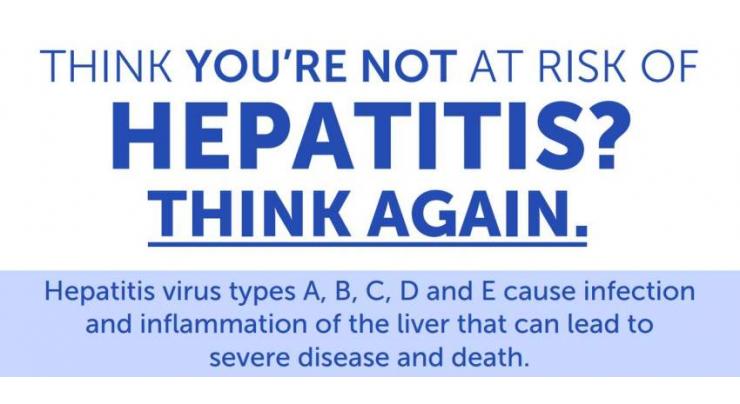
WHO Encourages Countries To Reduce Deaths From Viral Hepatitis
Fahad Shabbir (@FahadShabbir) Published July 28, 2016 | 07:25 PM

ISLAMABAD, (UrduPoint / Pakistan Point News - 28th july, 2016) : On the occasion of World Hepatitis Day, World Health Organization (WHO) has urged member countries to take rapid action to improve knowledge about the disease, and to increase access to testing and treatment services.
WHO Director-General Dr Margaret Chan said: "The world has ignored hepatitis at its peril. It is time to mobilize a global response to hepatitis on the scale similar to that generated to fight other communicable diseases like HIV/AIDS and tuberculosis." Dr Chan said today, only 1 in 20 people with viral hepatitis know they have it.
And just 1 in 100 with the disease is being treated. Around the world 400 million people are infected with hepatitis B and C, more than 10 times the number of people living with HIV. An estimated 1.45 million people died of the disease in 2013 - up from less than a million in 1990. In May 2016, at the World Health Assembly, 194 governments adopted the first-ever Global Health Sector Strategy on viral hepatitis and agreed to the first-ever global targets.
The strategy includes a target to treat 8 million people for hepatitis B or C by 2020. The longer term aim is to reduce new viral hepatitis infections by 90% and to reduce the number of deaths due to viral hepatitis by 65% by 2030 from 2016 figures.
The strategy is ambitious, but the tools to achieve the targets are already in hand.
An effective vaccine and treatment for hepatitis B exists. There is no vaccine for hepatitis C but there has been dramatic progress on treatment for the disease in the past few years. Dr Chan said the introduction of oral medicines, called direct-acting antivirals, has made it possible to potentially cure more than 90 percent of patients within 2-3 months.
But in many countries, current policies, regulations and medicine prices put the cure out of most people's reach. "We need to act now to stop people from dying needlessly from hepatitis," said Dr Gottfried Hirnschall, WHO's Director of the HIV/AIDS Department and Global Hepatitis Programme.
"This requires a rapid acceleration of access to services and medicines for all people in need." Some countries, however, are finding ways to get services to the people who need them. These efforts are made easier by the declining price of hepatitis C medicines.
Prices are now dropping, particularly in countries that have access to generic drugs. In 2015, a preliminary analysis estimated that 300,000 people living in low- and middle-income countries had received hepatitis C treatment based on the new direct-acting antivirals.
Related Topics
Recent Stories

Hania enjoys vacations in London

IMF Officials assure support to Pakistan’s economy

Naqvi directs foolproof measures for protection of Chinese nationals

Israel carries out attack inside Iran, report US media

Saudi Assistant Minister of Defence calls on army chief

Currency Rate In Pakistan - Dollar, Euro, Pound, Riyal Rates On 19 April 2024

Today Gold Rate in Pakistan 19 April 2024

Rock-solid Ruud racks up season-leading win in Barcelona

At UN, Iran says it will make Israel 'regret' reprisals

G7 hears calls for 'critical' Ukraine aid

EU seeks to leverage might to confront China, US challenge

5 Customs officials martyred as their vehicle ambushed by terrorists in D I Khan
More Stories From Pakistan
-
ANP announces schedule of intra-party elections
27 seconds ago -
Provincial policy dialogue on curbing trafficking in persons, smuggling of migrants held
37 seconds ago -
Tobacco industry's another deliberate attempt to lure children towards smoking
44 seconds ago -
DC for timely preparations for heavy rains
49 seconds ago -
Intermittent rain not letting cold season fade away; to continue for another day
11 minutes ago -
Foreign guests remain safe; one guard injured, CM informed
11 minutes ago
-
Sikh pilgrims return to Lahore from Kartarpur after Baisakhi Mela
11 minutes ago -
Seminar highlights importance of kitchen gardening, herbs
21 minutes ago -
Good governance, relief for masses top priorities of govt: Sarfraz Bugti
21 minutes ago -
President lauds Banking Mohtasib for providing Rs 1.26 b relief to bank customers
21 minutes ago -
Six injured in road crash
31 minutes ago -
Bilawal condemns attack, says foes of Pak-Japan want to spoil relations
31 minutes ago